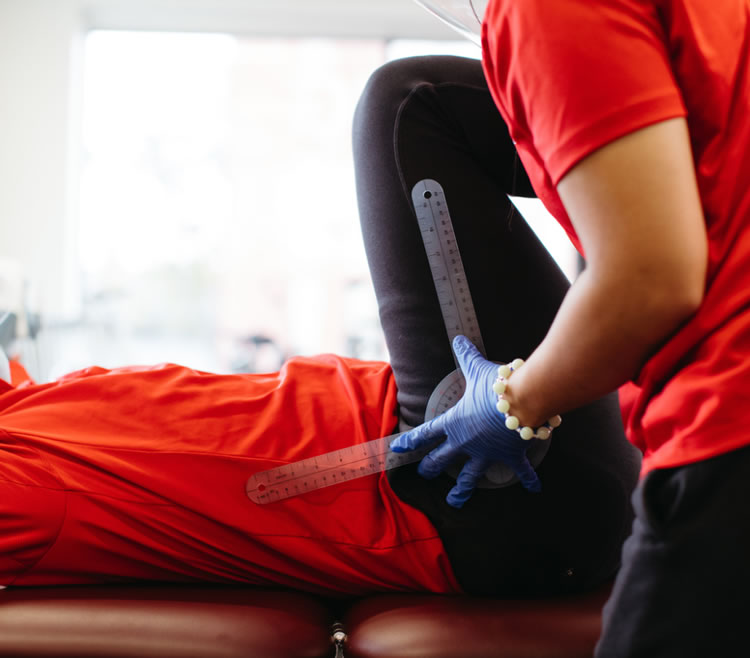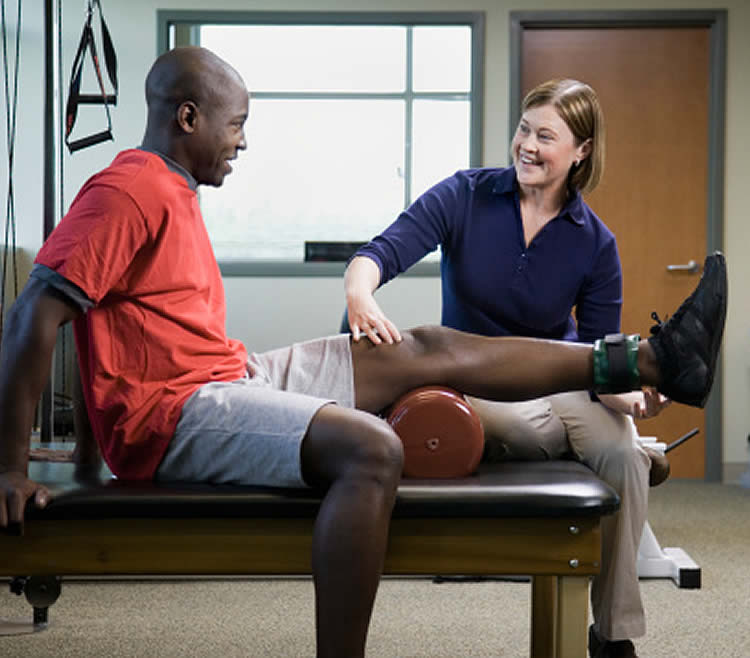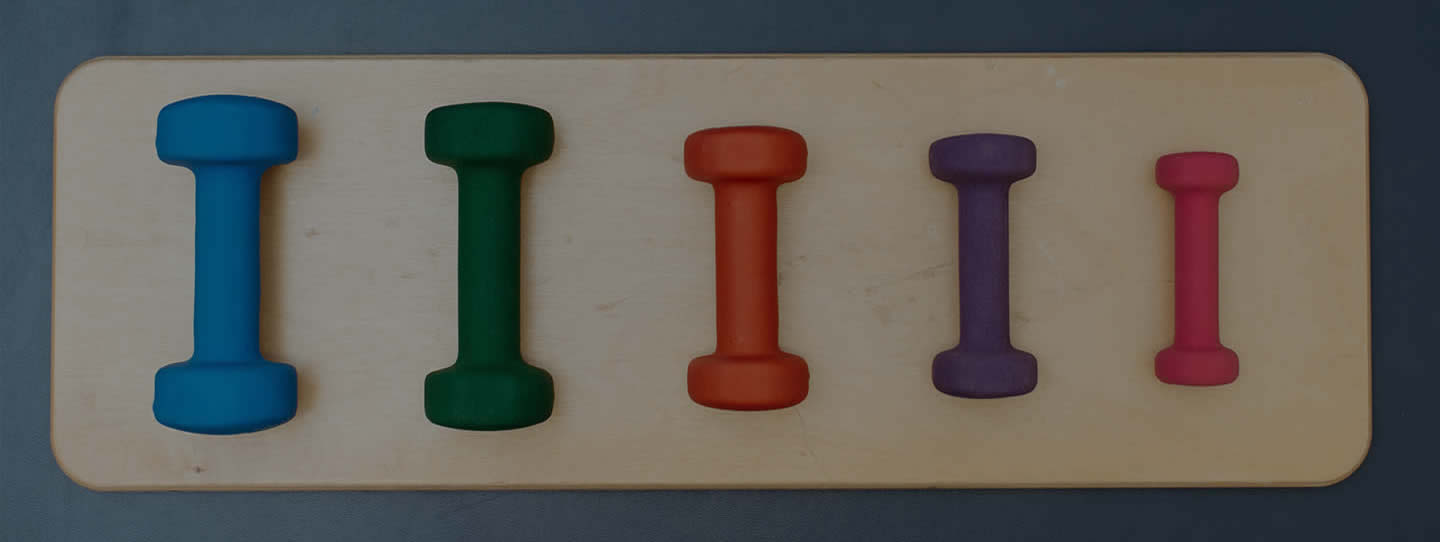What does a physical therapist assistant do?
Physical Therapist Assistants, work closely with patients to improve their ability to move easily or without pain. They use their knowledge of human anatomy to help people who suffer from an injury, accident, surgery or general mobility issues. A PTA’s work will allow patients to live more active, pain-free lives
Here are some things physical therapist assistants do:
- Teach patients basic exercises to improve range of motion and coordination
- Provide treatment to improve patient mobility or relieve pain using techniques like stretching, soft tissue mobilization, joint mobilization, electrical stimulation and more
- Communicate with the physical therapist to monitor patient progress and results
- Put on or remove supportive devices such as braces or splints
- Record the patient’s responses to treatment1
1California Employment Development Department Detailed Guide, Physical Therapist Assistants in California
Am I a good fit for the Physical Therapist Assistant program?
If you want a hands-on career that allows you to work with people one-on-one, you might enjoy physical therapy.
Here are some of the top skills and attributes that make for a great physical therapist assistant:
Communication – Because physical therapist assistants work directly with patients, they must be able to communicate effectively with them, explaining exercises, adaptive devices and more.
Monitoring – Physical therapist assistants should be able to monitor and assess their patients’ performance and progress.
Social perceptiveness – Being aware of and understanding patients’ reactions helps physical therapist assistants provide patient-centered service.
Service orientation – A great physical therapist assistant has a passion for helping patients and for providing the best care possible.
Instructing – Physical therapist assistants must be able to lead patients through exercises and other therapeutic interventions.
Where do physical therapist assistants work?
What will I learn in the Physical Therapist Assistant program?
The goal of the PTA school's program is to help you graduate with the confidence, knowledge
and qualifications to be a physical therapist assistant.
Physical therapist assistants play a critical role in helping physical therapists with the rehabilitation of rehabilitate patient —including accident victims, injured athletes, those suffering from burns, strokes, arthritis and more.
American Career College's Physical Therapist Assistant associate of Occupational Science
degree program encompasses two clinical courses at the conclusion of the classroom and
laboratory portion of the program. A total of 600 clinical hours is required for program
completion.
Clinical Practicum I
This clinical practicum experience provides each student with the opportunity to observe and apply basic skills performed within the classroom while under constant supervision in the clinical setting. The aim of this experience includes observation of departmental activities including familiarization in delegation while applying basic intervention skills, safety awareness, documentation, communication and modality application.
Clinical Practicum II
This clinical practicum experience is a full-time 10-week clinical affiliation where students will have the opportunity to experience clinical practice in a minimum of two rehabilitation settings. Upon completion, the student is expected to achieve knowledge and skills that are required to implement a plan of care under the direction of a licensed physical therapist to improve mobility and function of patients of varying diagnoses and impairments. Students are expected to perform clinical skills with increasing efficiency as well as implement knowledge learned through ongoing coursework including cardiopulmonary rehabilitation and therapeutic interventions related to prosthetics and orthotics. Attention will be paid to developing proficiency in the communication and interaction between a PT/PTA as well as demonstrating appropriate PT/PTA clinical relationship. The student will attain the ability to provide patient care with quality, efficiency, complexity and consistency under the supervision and guidance of a physical therapist and reflective of a PTA student progressing toward competency consistent with an entry level physical therapist assistant.
Didactic and Laboratory Courses
Various delivery methods are employed within the didactic portion of the school's program. Self-discovery methods and problem-based learning supplement standard lecture delivery platforms. In combination, these delivery methods will maximize exchange of information and encourage student initiative in and out of the clinical setting.
Documentation skills will be developed throughout the class curriculum, with emphasis placed on accurate documentation and its relationship to patient safety, practitioner communication, interdisciplinary plans of care, denied reimbursement and practice acts/laws.
Interdisciplinary instruction personnel from inside the college are incorporated into some classes, using the expertise of other program instructors (e.g., respiratory). Interdisciplinary instruction personnel from outside the college are incorporated into some classes, using the expertise of other clinical professionals (e.g., pharmacy).
Exposure to advanced equipment will be available to students in a newly constructed facility.
For a complete description of coursework in these modules, please refer to the ACC Catalog.
What is the difference between a physical therapist and a physical therapist assistant?
A physical therapist is a licensed healthcare professional with advanced education (typically a
doctoral degree) who evaluates, diagnoses and provides personalized treatment plans to help
patients recover from injuries, surgeries or manage chronic conditions.
A physical therapist assistant works under the guidance of a physical therapist. They have
completed an associate degree program and support the therapist by implementing treatment
plans, guiding patients through exercises and monitoring progress
How long is the Physical Therapist Assistant program?
Students can earn their associate degree to become a physical therapist assistant in as little as 20 months.
How is student achievement measured for a physical therapist assistant student?
CAPTE Physical Therapist Assistant Student Achievement Measures (Orange County Campus)
|
|
2020
|
2021
|
Two-Year Average
|
|
Graduation Rate
|
96%
|
95%
|
96%
|
|
First-Time Exam Pass Rate*
|
71%
|
76%
|
73%
|
|
Ultimate Licensure Exam Pass Rate*
|
90%
|
83%
|
87%
|
|
Employment Rate
|
100%
|
100%
|
100%
|
*Obtained from the Federation of State Boards of Physical Therapy.
How much does the Physical Therapist Assistant program cost?
ACC admissions advisors and financial aid advisors are here to support you. They can help you figure out the physical therapist assistant school cost and help you explore financial aid options.
To learn more about ACC’s Physical Therapy Assistant program cost, access our tuition info.
Is financial aid available?
Yes, financial aid and scholarships are available for those who qualify.
Will I get real-world PTA training?
Yes! ACC's Physical Therapist Assistant program includes over 600 hours of clinicals which gives students the opportunity to demonstrate and reinforce the knowledge and skills they acquired learning hands-on throughout the training program.







